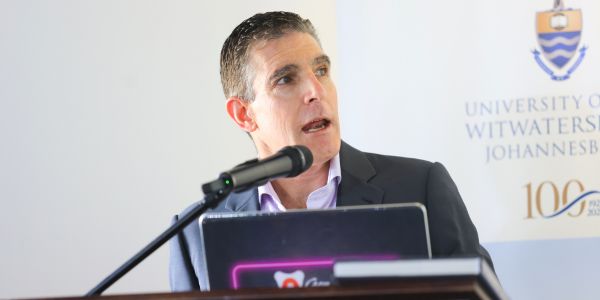When rugby players retire
- Wits University
Staking your life on rugby is a huge gamble, says sports & exercise medicine physician, Jon Patricios, and shares 4 tips to navigate a high-performance career.
Rugby season is imminent in sports-mad South Africa, already preceded by the competitive schoolboys’ Easter Rugby Festivals.
In an interview with Springbok Rugby coach Rassie Erasmus and Steven Kitshoff – a recent reluctant Springbok Rugby retiree following a career-threatening injury – Professor Jon Patricios shared insights on charting a rugby career and managing the inevitability and impact of retirement.

Patricios was Rassie’s second doctor when Rassie played for the national team in the 1990s. Patricios is now a sports medicine consultant to SA Rugby, and he was previously team doctor for the Golden Lions and the Cats Super 12 rugby teams.
He directs the Wits Sport and Health (WiSH) research group at Wits University, focusing on sport-related concussion and the health benefits of physical activity.
Professional players in public
Patricios says that operating as a team doctor is ethically more challenging because of stakeholder interest and public scrutiny. This is different to a typical doctor-patient relationship, which is strictly confidential.
“In professional sport, it’s quite public, so people know about the player’s injuries. There’s a lot of stakeholders – coaches, the other players, board members, sponsors – and the public also think they have a right to know about a player’s injury,” he says.
For a team doctor, there’s specific ethical issues around whether a player is fit to play. Patricios says it’s rare that a pro rugby player goes out onto the field, week in and week out, and isn’t carrying some sort of niggle.
“You have to ask if it’s safe to put that player back on the field? And there’s a spectrum of injuries; something like concussion, you’d never risk, but an ankle sprain you might say, ‘well, it’s a World Cup semi-final, we’re going to take a chance with this athlete’,” says Patricios, who is an expert of sport-related concussion, director of Sports Concussion SA and a sports concussion consultant to World Rugby.
The implication of playing professionally is both performing in the spotlight and an emphasis on conditioning.
- So Patricios’s first tip is about making sure you’re prepared for rugby at any specific level. “If you’re going to play senior rugby, you have to meet certain standards, otherwise we recognise you as an injury risk.”
Rugby must be a parallel career
Patricios urges pro rugby players to plan for a life with and after rugby. “My message often to young schoolboys and schoolgirls and their parents is that rugby must be a parallel career. To stake your life on rugby is a huge gamble. You never know when it might end.”
- For his next tip, Patricios says, “I want to emphasize two things: you need to be conditioned, and you need to make sure you plan for a life with and after rugby, and that’s critical in taking on your career. Once that’s in place, you can embark on your rugby career with confidence.”
Rugby retirement and mental health
Retiring from professional rugby, or any sport, impacts mental health, says Patricios. Athletes are used to a structured environment, “in rugby, maybe from when they were 15 years old.”
From probably playing 1st XV in high school, through under-20 setups, to provincial, national and then international levels, the pressure mounts from the game, the media, and the public.
“This limelight that the players are in – and it’s a short period of time, relatively – and then suddenly that’s cut short; how do you deal with that from a mental perspective?” says Patricios. Hence, tip 3:
- Define yourself as a complete person and not just a rugby player. At some point your professional career will end but your role in society need not. The importance of mental health during and after professional rugby is increasingly being recognised, says Patricios, so much so that World Rugby has launched the Brain Health Programme.
The Brain Health Programme enables players and ex-players to arrange a consultation with a medical person, free of charge, to talk about the fact that they’re struggling since stopping rugby. South Africa is the fourth country to sign up for the Brain Health Programme.
Retirement from professional sport, whether planned or impromptu, affects athletes’ mental health just as it would everybody else. “It’s what you’ve worked for, for so long, and I don’t think the public appreciate that,” says Patricios. “It really is a difficult thing to come to terms with redefining your purpose in life.”
Ongoing mental health support
For that reason, sustaining networks goes together with addressing mental health after pro sports retirement. Patricios says he always regarded the physiotherapist as one of the great mental supports – “there’s a lot of conversations that take place on that physio plinth” – and, increasingly nowadays, there’s mental health coaches and support teams. Hence, tip 4:
- Patricios says, “I think it’s important to continue with that mental health focus and support, acknowledge the relevance and put systems in place to address mental wellbeing – just as you would go for physical checks.”
He concludes, “Professional rugby is a very stressful environment, where you’re acting in a public space, the pressures and demands are huge, and we haven’t really had enough of an appreciation for the mental stress during and after a career.”

